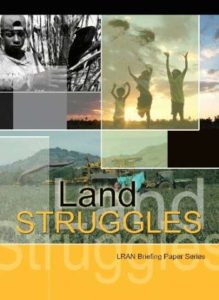
Introduction
Three-quarters of the world’s 852 million men and women suffering from hunger are found in rural areas and depend on agriculture for their survival. Most of them are landless farmers or have such tiny or unproductive plots of land that they cannot feed their families”. This was the assessment of the Food and Agriculture Organization of the United Nations (FAO) released at the second International Conference on Agrarian Reform and Rural Development in Porto Alegre, Brazil, in March 2006.
Immense numbers give an indication of the scale of the problem, but the urgency of the matter comes from an understanding that millions of people throughout the Global South who depend on agriculture for their livelihood are today in the process of losing their land. Many millions more who have been deprived of their land are engaged in a daily struggle to regain their rights, their dignity, and way of life.
The Land Research and Action Network’s briefing paper series is intended to highlight a selection of local perspectives on the root causes of land loss to and highlight some of the ongoing land struggles from around the world. Eight issue papers have been selected and trimmed down to publish in magazine form in simplified English. These papers, their extended versions, and many more articles are available at landaction.org.
The central theme running through the papers gathered here is the political nature of land loss and the related need for political empowerment of the landless. Land grabs that are clearly illegal have been carried out with impunity by the politically connected, from colonial times to the present day. However, land is also being lost by the rural poor, with no less devastating consequences, through the combined effect of neoliberal macro-economic and development policies. These have been pushed and stretched over the decades by institutions – like the WTO, the World Bank and IMF – that are accountable to local people, but which can be taken advantage of by national political elites. Policies promoting export production, the expansion of agribusiness, and the removal of import protections and public sector supports for national and local markets have undercut the economic viability of peasant, small and family farmers, and cooperative/collective agriculture. Over decades, farming peoples have been displaced from fertile lands toward steep adn marginal soils, and the progressive incorporation of these displaced peoples into poorly paid seasonal labor forces for export agriculture.
Contents
Alienation of Land and Resources in Cambodia, by Shalmali Guttal
Leaseback Arrangements: Reversing Agrarian Reform Gains in the Philippines, by Carmina B. Flores-Obanil and Mary Ann Manahan
To Their Credit? Assessing the World Bank’s Programmes in Brazil, by Maria Luísa Mendonça
Human Rights Violations Against Peasants, Indigenous Peopoles and Other Rurual Communities, by Sofia Monsalve Suarez
Excess Sugar: The Devastating Impacts of the Sugarcane Industry in Brazil, by Maria Luísa Mendonça
The Myth of Biofuels, by Edivan Pinto, Marluce Melo and Maria Luísa Mendonça
When Water was Used to Clear the Land, by Rebeca Leonard
Food Sovereignty and Agrarian Reform: Alternative Model for the Rural World, by Peter Rosset
Published in October 2007
For more issues in this series, visit focusweb.org/landstruggles





